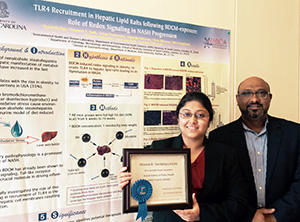Suvarthi Das receives top award in competition
November 5, 2014

Suvarthi Das and her faculty mentor Dr. Saurabh Chatterjee are shown with her scientific poster that
took first-place honors in a recent competition at
the Arnold School of Public Health.
Think “obesity,” and people generally associate strokes, heart disease, high blood pressure and some types of cancer as health problems arising from having too much body fat.
But Suvarthi Das, a doctoral student working in the lab of Dr. Saurabh Chatterjee at the Arnold School of Public Health, is studying the impact of obesity on the liver – specifically nonalcoholic steatohepatitis (NASH).
The studies being conducted in Chatterjee’s lab in the Department of Environmental Health Sciences are part of a growing body of scholarly work to understand NASH, considered a “silent” disease of the liver. Although NASH can resemble liver disease caused by the over-consumption of alcohol, it is found in people who drink little or no alcohol. It is the more serious form of nonalcoholic fatty liver disease (NAFLD).
In addition to fat in the liver, NASH is characterized by inflammation and damage. In fact, people with NASH often appear to be in good health and have no symptoms of liver problems. Over time, NASH can lead to cirrhosis, which occurs when the liver is permanently damaged and unable to function properly.
The research by Das was recognized with first-place honors in a scientific poster competition, held in conjunction with the Winona B. Vernberg Distinguished Lecture Series last month. The lectures, which began in 2009, are held in memory of the Arnold School’s founding dean, whose research in the field of environmental health was nationally and internationally recognized. Vernberg’s legacy at the Arnold School also includes her great passion for students and their academic success.
“Obesity is rising at an alarming rate in the United States and in other countries around the world,” said Das. “Our research is important because there is no cure or specific treatment for NASH.”
In her study, Das examined how exposure to bromodichloromethane (BDCM), a byproduct (caused in the purification) resulting from the chlorine-disinfection of water, can lead to NASH in people with obesity, even at its present permissible limit in drinking water. Her study found that the Toll-like receptor 4 (TLR4), a molecule that is crucial to the process of inflammation, contributes to the BDCM and redox signaling driven inflammation process in the liver.
The results could lead to potential therapeutic targets for remediation of NASH in its early stages before damage occurs in the liver, said Das, who is the first author on two papers in scientific journals and a co-author on four others.
Liver inflammation is the focus of an NIH center grant for which Chatterjee’s lab will receive $865,000 from 2014 – 2019. The CAM Center for Epigenetic Regulation in Inflammation is being led by Dr. Prakash Nagarkatti). Chatterjee and Dr. Daping Fan are co-principal investigators for the project.
Chatterjee also has received COBRE PILOT funding from the National Institute of General Medical Sciences (part of the COBRE USC, directed by Drs. Prakash and Mitzi Nagarkatti). The award of $206,000 for two years will fund studies on nonalcoholic steatohepatitis.



_01.jpg)
_02.jpg)